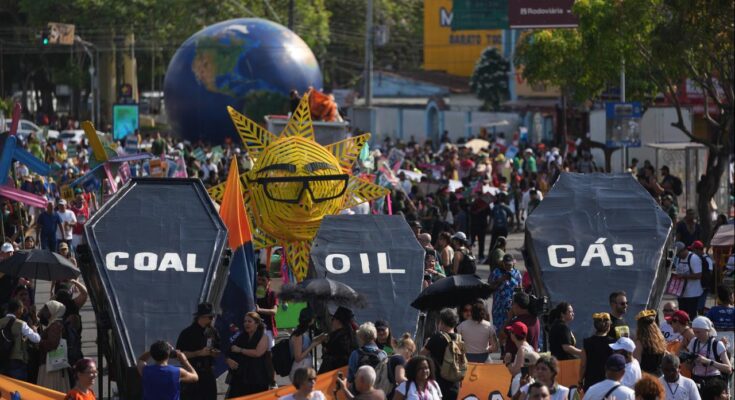The second week of the World Climate Conference begins in Belem, Brazil. Now the focus is on the ministers – the hot phase of negotiations begins.
Federal Environment Minister Carsten Schneider got to know the rainforest around Belem at the weekend. What he saw shocked him: “Destruction on a massive scale” – destruction he could not have imagined.
That’s why Brazilian President Lula da Silva is holding a climate summit in the Amazon city: to show what the situation is like in the earth’s lungs – and in the best case scenario to spur negotiations. This year, the pressure came from thousands of people in Belem – including many indigenous communities protesting over forest and climate protection.
The Minister took over
In the second week, ministers will take over control of the negotiations. Federal Environment Minister Schneider traveled to Brazil on behalf of Germany. “We have held many COPs with marked targets in recent years,” he said. “And now it’s time to put it into action.”
Implementation – according to environmental associations, this is what is missing, for example, when switching away from coal, oil and gas: “I believe this will be one of the really big things this week,” said Christoph Bals of the environmental and development organization Germanwatch.
Does the argument arise now?
The Brazilian conference management’s trick of delaying disputes at the start of the conference led to an increase in the first week, according to Bals. But now the dispute is difficult to avoid. Two years ago, the global community in Dubai agreed to shift away from fossil fuels. But how this can happen in a socially just way remains unclear.
“Oil-producing countries in particular are blocking,” said Martin Kaiser of Greenpeace. He also criticized the fact that at least 1,600 lobbyists from the oil, gas and coal industries are represented in Belém, according to data analysis carried out by environmental groups. So far, this lobbying has succeeded in delaying the deployment of more wind and solar energy, says climate researcher Niklas Höhne in Belém. “The fossil fuel industry currently generates profits of three billion dollars a day and that is why it is experiencing so much loss and rebelling against the success story of renewable energy,” said Höhne. “You can see it everywhere.”
Schedules are important
However, this controversial topic has not yet received an official place in the negotiating text. This is why the ideas in Lula’s opening speech were accepted by several delegates: “We need a roadmap so that humanity can overcome dependence on fossil fuels, stop and reverse deforestation, and mobilize resources for this in a fair and planned way,” he said.
According to observers, the homework from the last world climate conference in Baku – the climate finance roadmap – is now important. Especially for delegates from southern countries, countries like Malawi or small island countries that rely on money from northern countries.
A deal perhaps?
Bals said an agreement between developed and developing countries was possible. “But this can only be successful if the drivers of adaptation including the necessary funding are decided in advance.”
Traditionally, ministers do not come to climate change summits empty-handed. In total, Germany has contributed six billion euros to international climate finance in recent years. It is still unclear how much Germany will contribute this year. At least Germany wants to contribute a large amount to Lula’s investment funds to protect tropical forests.
“Money well spent”
“It’s really been a good investment,” Schneider said. “Because this ensures that forests in the Amazon, for example, remain intact.”
The official end of the climate conference is scheduled for Friday, November 21. At least in the first week, Brazilian participants were still confident that they could maintain such a state, as hinted by conference leader Correa do Lago.
Germanwatch’s Bals believes this scenario is unlikely. So far, no climate conference has ended on time and he has seen them all. After all, what matters is not when the hammer falls, but rather what is decided when the hammer falls.




